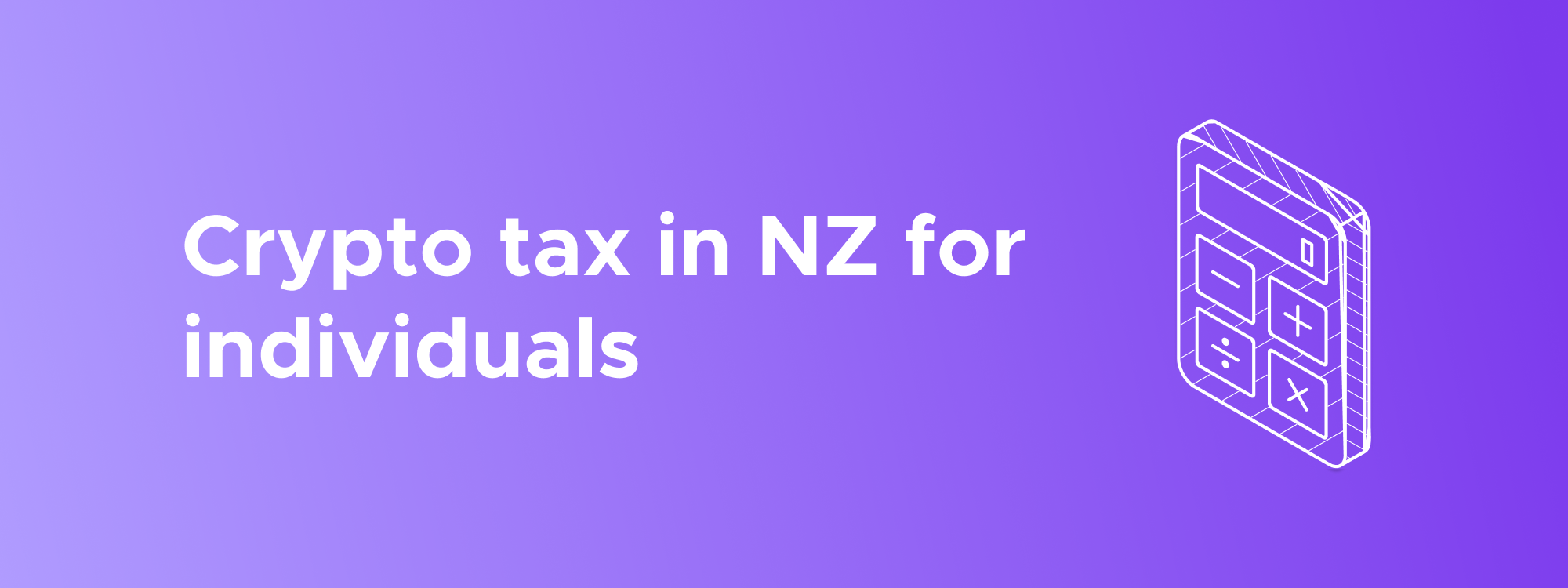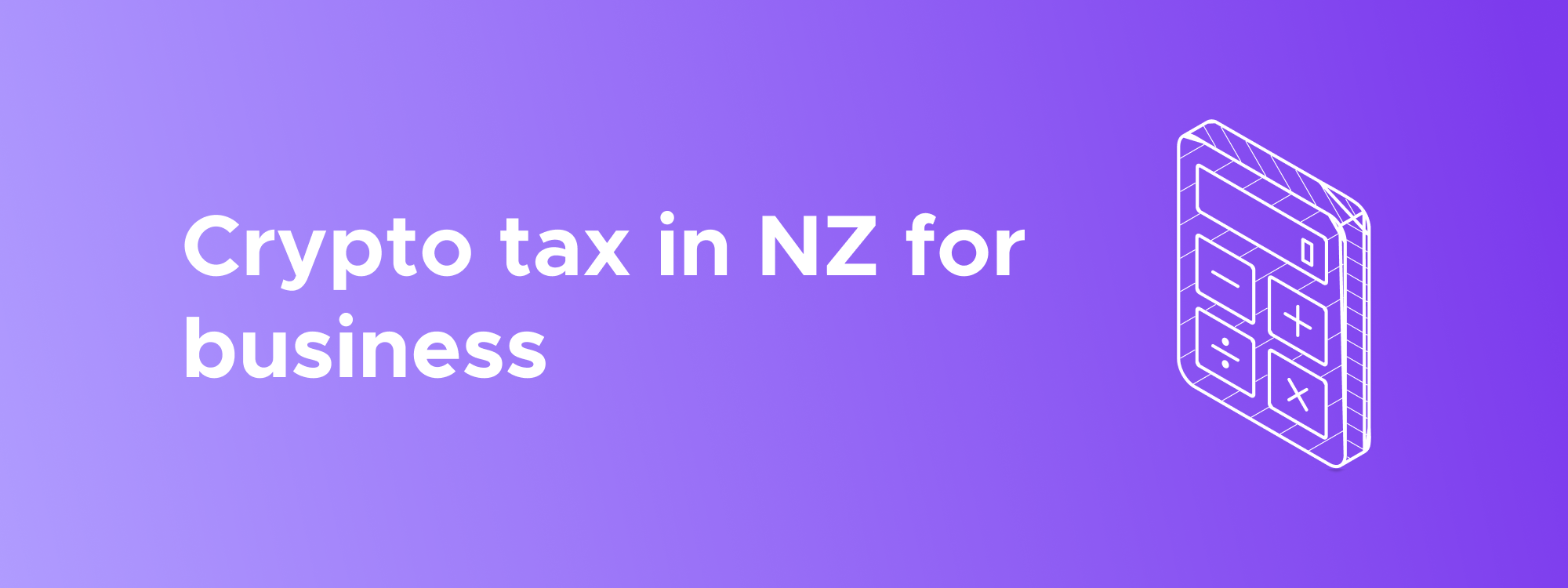
In a poll carried out in early 2022, results showed that 18.4% of adults in New Zealand had investments in crypto, marginally smaller than the 19.7% who hold traditional property assets.
With growth comes regulation, and the IRD (Inland Revenue Department) has taken proactive steps towards crypto regulation by providing New Zealand taxpayers with guidelines as to what is and isn’t considered taxable. This guide aims to explain how crypto activity is taxed in New Zealand, from an individual point of view and a business point of view.
Crypto tax in New Zealand for individuals
In New Zealand, cryptocurrencies and crypto assets are treated as a form of property for tax purposes, instead of legal tender. As a result, they are subject to the same type of tax as property depending on the specific nature of the crypto transaction in question. Individuals should be mindful of the tax consequences of their crypto activity, which is why we’ve put this guide together for you! Let’s get started.
Buying crypto with fiat currency
Good news for all of you who aped into the crypto market in the last few years! Buying crypto with fiat currency is currently not considered a taxable event by the IRD.
Selling, trading and exchanging crypto
In New Zealand, the intention with which you acquire your crypto assets is paramount to how they will be taxed moving forward. In most cases, any value you receive from selling, trading or exchanging crypto assets will be taxable if you have acquired the asset with the purpose of disposing of it and/or making a profit from it.
Lending crypto
DeFi has exploded in popularity across the world, and New Zealand crypto users are no exception to this. In the past 12 months, we’ve seen huge growth in the number of decentralised lending platforms promising appealing returns, and as such, users have flocked to engage with them.
In New Zealand, if the main purpose of you interacting with a lending protocol is to make a profit (for example by earning interest on your crypto loan), then any value received from the protocol will be taxable as income.
Mining crypto assets
In New Zealand, mining crypto assets is taxable in a few different circumstances. The first is if you are in the business of mining crypto assets - more on this a little bit further down the page. The remaining reasons you’ll pay tax on mining crypto assets is if you are intending to dispose of the mined assets, or by mining you are intending to make a profit. The IRD states that you’ll first have to pay income tax on any mined rewards earned, but notes you may also need to pay income tax on any profit made if you sell or exchange your mined assets later on.
Staking rewards
As previously mentioned in the ‘Lending crypto’ section of this guide, actioning anything involving crypto assets will likely be taxable if you are doing so with the intention of making a profit. Staking is a process where a user locks up a specified amount of cryptocurrency or a crypto asset in the custody of a certain protocol or platform, receiving rewards or ‘interest’ in return for doing so. The IRD is likely to treat participation in staking programs as entering into a profit-making scheme, and therefore any rewards will likely be taxed as income.
Airdrops
According to the IRD, if you receive new crypto assets from an airdrop, there are a variety of taxable implications.
Firstly, if your airdropped crypto assets were passively acquired (e.g. you didn’t do anything in order to receive them), you may not need to declare them for tax purposes. We recommend working with a local tax professional to determine what best suits your personal circumstances.
Secondly, airdrops that are not passively acquired may be taxable either on receipt, on disposal, or even both! In the event of receiving an airdrop, the value received will likely be taxable instantly if you are a crypto business, have acquired the crypto assets as part of a profit-making scheme, provided services to receive the airdrop, and/or receive airdrops on a regular basis in return for providing a service. On top of this, any profit made from selling or exchanging your airdropped assets in this situation would also be taxable.
Hard forks
In New Zealand, the IRD states that if you have received new crypto assets from a hard fork, like airdrops, they may be taxable on either receipt, disposal, or both. In most cases, receiving assets as a result of a hard fork will not be taxable unless you are a crypto business or you acquired those particular assets as part of a profit making scheme. As hard forks are generally out of the control of individual users, it is not likely that receiving assets from one will be considered participating in a profit making scheme. In most cases, once you dispose of your crypto assets received in a hard fork, the disposal will be taxable.
If you’re unsure on whether your assets received from an airdrop or a hard fork will be taxable, we recommend that you talk to a local tax professional.
NFTs
The IRD treats the taxable implications of NFTs differently depending on whether you’re creating them, trading them, or just enjoying them via personal use.
If you’re an NFT creator who is intentionally selling your NFTs, the IRD will likely treat you as a business. If so, your sales will be subject to both income tax and GST (goods and services tax).
If you acquired your NFTs for the purpose of disposal, in that you bought them with the intention to sell them or exchange them later on, you’ll likely have an income tax liability on the sale of those NFTs.
The IRD recognises that NFTs are different from some other crypto assets in that they can be held for personal use and enjoyment. Who doesn’t like to look at a jpeg of an 8-bit monkey? If you can prove you acquired your NFTs for personal use to the IRD, the specific assets won’t be taxable. You’ll need to provide clear and compelling evidence about your purpose for acquiring the NFTs if you do choose to go down this route.
Now that we’ve covered crypto tax in New Zealand from an individual’s perspective, it’s time to dive into the business end of things.
Crypto tax in New Zealand for business
Crypto businesses
In New Zealand, if you run a crypto business - that is, a business that lets customers use cryptocurrencies or crypto assets to exchange value - any profits made will be taxable as ordinary income.
Using crypto in business transactions
Even if your business isn’t considered a ‘crypto business’, you’ll still need to account for any instances of using crypto assets as a part of your business activity. To do so, you account for crypto assets used in business transactions the same way you would for any other business asset, combining to form part of your business income. As with any business income, you will also need to account for GST.
Paying your employees in crypto
If you’ve decided to pay your employees either fully or partially in cryptocurrency or crypto assets, you will need to account for PAYE or FBT on these payments. You can read more information about the specific taxable implications of paying your employees in crypto here.
Record-keeping requirements
Now we’re onto the fun stuff, maintaining adequate records!
In order to satisfy the IRD’s record-keeping requirements, for every crypto transaction you do, you will need to note:
- The type of crypto asset
- The date of the transaction
- The type of transaction (e.g. buy, sell, airdrop)
- Number of units of the asset (if applicable)
- The value of the transaction’s assets in New Zealand dollars
- The total units of each crypto asset held at the beginning and end of the year
- Any crypto exchange records
- Any bank statements showing crypto related transactions
- Your crypto wallet and exchange addresses
The IRD states that you will need to keep these records for a minimum of 7 years, even if you dispose of your crypto assets during that time.
How Crypto Tax Calculator can help
Manually maintaining records of all of the above doesn’t sound like much fun, does it? Spoiler: it’s not. That’s where we come in! Our crypto tax calculator software can help you aggregate all of your crypto transaction data to help calculate any gains, losses, income and/or expenses. As an added bonus, we’ve worked with tax professionals from New Zealand to ensure our platform follows your region’s guidelines.
Once you’ve imported all of your data to form a complete overview of your trading history, you’ll be prompted to reconcile any outstanding lines. After those are reconciled, you’ll have the option to download reports showing these values clearly. These reports and the information included will give you the amounts needed to complete your yearly tax return for the IRD.
Tim Brunette is the CTO of CTC, where he leads technical operations and applies his expertise in cryptography, and machine learning to solve challenging problems in the cryptocurrency ecosystem. He previously worked at Accenture, holds a Bachelor in Space Engineering and a Masters in AI.






